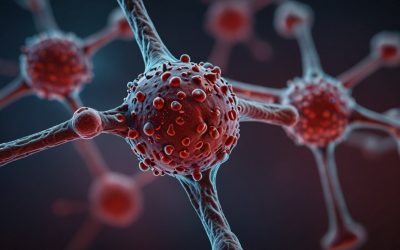An ounce of prevention is worth a pound of cure, and this rings particularly true when you consider the role of inflammation in chronic diseases. As you navigate the complexities of your body’s response to harm, it’s vital to understand that not all inflammation is the enemy; it’s your body’s natural defense against injury and infection. However, when this response doesn’t turn off, you’re faced with a silent threat that’s implicated in a host of chronic conditions ranging from heart disease to diabetes. You know that managing inflammation is crucial, but the question remains: How do you distinguish between the protective and the potentially harmful? Unraveling this mystery could be the key to safeguarding your health in the long term, and what you might uncover about the triggers and risk factors could change your approach to wellness altogether.
Key Takeaways
- Chronic inflammation is a prolonged and dysregulated immune response that is common among many chronic diseases.
- Lifestyle choices and environmental exposures such as poor diet, disrupted sleep patterns, and exposure to toxins contribute to the persistence of chronic inflammation.
- Chronic inflammation is implicated in the development and progression of metabolic syndrome, type 2 diabetes, non-alcoholic fatty liver disease, cardiovascular disease, and cancer.
- Lifestyle modifications, including regular physical activity, anti-inflammatory diet and minimizing environmental toxicants, can help prevent and manage chronic inflammation and its associated diseases.
Understanding Chronic Inflammation

Delving into the complexities of chronic inflammation, it’s crucial to recognize the myriad factors, from lifestyle choices to environmental exposures, that contribute to its persistence and its role in various chronic diseases. Unlike acute inflammation—a protective and localized response of the immune system that serves to eliminate harmful stimuli and initiate repair—chronic inflammation is a prolonged, dysregulated, and maladaptive response that involves a host of inflammatory cells and cytokines. It poses a significant threat to your well-being, often serving as a common thread among a spectrum of chronic diseases.
The etiology of chronic inflammation is multifactorial. Persistent infections, sedentary behavior, visceral obesity, and intestinal dysbiosis are pivotal in its pathogenesis. These conditions foster an environment ripe for the continuous activation of the immune system. Psychological stress, poor diet, disrupted sleep patterns, and exposure to environmental toxicants and xenobiotics further exacerbate this inflammatory state. Pro-inflammatory cytokines, such as IL-6 and TNF-alpha, orchestrate a systemic inflammatory response that can disrupt metabolic homeostasis, culminating in insulin resistance and oxidative stress—two hallmarks of chronic disease pathology.
The consequences of unchecked chronic inflammation are profound. It is implicated in the development of metabolic syndrome, type 2 diabetes, non-alcoholic fatty liver disease, cardiovascular disease, and cancer. Targeting inflammatory pathways through lifestyle interventions or pharmacological means has demonstrated promise in mitigating these conditions. However, the lack of standardized biomarkers for chronic inflammation challenges the precision of diagnosis and the effectiveness of treatment.
To serve those affected by these conditions, a comprehensive understanding of chronic inflammation and its multifaceted nature is indispensable. A multidimensional approach, integrating behavior modification and therapeutic strategies, is essential to attenuate the burden of chronic inflammation and its associated diseases.
Triggers and Risk Factors
Building on the understanding of chronic inflammation’s role in disease, it’s essential to examine the triggers and risk factors that initiate and sustain this harmful condition. As you delve into the complexities of chronic inflammation, recognize that a multitude of factors interplay to ignite this persistent inflammatory state. Immune cells, when incessantly activated, release inflammatory cytokines that perpetuate tissue damage and contribute to the development of chronic conditions.
Consider these pivotal triggers and risk factors:
- Chronic Infections: Persistent microbial assaults can lead immune cells to maintain a long-term inflammatory response.
- Lifestyle Factors: Sedentary behaviors, poor dietary choices, and obesity, particularly visceral adiposity, significantly elevate inflammation levels.
- Environmental Factors: Exposure to industrial toxicants and xenobiotics can disrupt the immune system, sparking chronic inflammation.
- Psychological Stress: Chronic stress is a precursor to inflammation, as it can alter hormone levels and immune responses.
- Age and Hormonal Changes: Increasing age and changes in sex hormone levels are associated with a heightened inflammatory state, often seen in conditions like systemic lupus erythematosus and rheumatoid arthritis.
As you serve others, it’s vital to recognize that addressing these risk factors can play a substantial role in mitigating the burden of chronic diseases. Interventions targeting lifestyle modifications, stress management, and environmental health can reduce the prevalence of chronic inflammation. Furthermore, understanding these triggers and risk factors allows for a more precise approach in both preventing and managing conditions underscored by chronic inflammation. Your commitment to this knowledge is key in fostering healthier lives in those you aspire to help.
Biological Mechanisms Explained

To grasp the biological mechanisms underpinning chronic inflammation, it’s crucial to explore how cellular and molecular processes become dysregulated and contribute to the onset and progression of various chronic diseases. Within your body, inflammatory cells are the sentinels of the immune response, poised to defend against pathogens and heal damaged tissues. However, factors such as chronic infection and persistent exposure to harmful stimuli lead to a continuous recruitment and activation of these cells, resulting in elevated pro-inflammatory cytokine levels.
These cytokines, along with other inflammatory mediators, create a systemic environment that perpetuates inflammation. Over time, high cytokine levels can cause a cascade of detrimental effects, including increased production of reactive oxygen species. Such species are capable of inflicting DNA damage, which can alter gene expression and disrupt immune regulation. The markers of inflammation, like IL-6 and IL-1Ra, climb with age and disease, reflecting the chronic nature of the inflammatory response.
While acute inflammation is a protective and localized response, chronic inflammation is systemic and can silently underlie and exacerbate conditions such as metabolic syndrome, cardiovascular disease, and cancer. The immune system’s balance is skewed, as the sustained immune response becomes deleterious rather than beneficial. Randomized controlled trials targeting specific cytokines have illustrated that reducing these inflammatory signals can mitigate disease risk, underscoring the importance of immune regulation in maintaining health and preventing chronic disease.
Your understanding of these biological mechanisms is pivotal when striving to serve those afflicted with chronic diseases. Through this knowledge, you can better appreciate the complexity of chronic inflammation and its far-reaching consequences on overall health.
Impact on Chronic Conditions
Chronic inflammation acts as a catalyst in the development and progression of numerous long-term conditions, ranging from metabolic disorders to cardiovascular diseases and cancer. When inflammatory cells persistently infiltrate tissues, they set the stage for tissue damage. Consequently, the risk of chronic inflammation spiraling into a range of chronic diseases becomes significantly higher.
Systemic inflammation, for instance, is a key player in the realm of chronic health conditions. It’s not just a localized event but rather a widespread disturbance that can detrimentally affect various organ systems. The link between chronic inflammation and disease is multifaceted, involving complex interactions between immune cells and the affected tissues. To address this, you must consider the following points:
- The inflammatory response, while initially protective, can become destructive over time, leading to inflammatory conditions such as rheumatoid arthritis and inflammatory bowel disease.
- Chronic inflammation has been implicated in the etiology of type 2 diabetes, where inflammatory cells interfere with insulin signaling, exacerbating insulin resistance.
- Cardiovascular diseases often find their roots in chronic inflammation, with atherosclerosis being a prime example of inflammatory cells contributing to plaque formation and arterial damage.
- Cancer progression has been linked to chronic inflammation, which can promote tumor growth and metastasis.
- Neurodegenerative diseases like Alzheimer’s may also be exacerbated by chronic inflammation, which can induce neuronal damage and affect cognitive function.
Prevention and Management Strategies

Recognizing the significant role chronic inflammation plays in various diseases underscores the importance of adopting effective prevention and management strategies. You’re tasked with guiding individuals at risk for or suffering from chronic inflammatory disorders, and as such, you must prioritize interventions that are both evidence-based and feasible.
Lifestyle modifications hold a paramount place in your recommendations. Regular physical activity is pivotal; it has been empirically linked to reduced systemic inflammation. Encourage your clients to engage in consistent exercise, which also mitigates insulin resistance, thus lowering the risk of type 2 diabetes mellitus. Concurrently, diet and lifestyle changes that emphasize the consumption of foods with anti-inflammatory properties, such as fruits, vegetables, and omega-3 fatty acids, should be a staple in your advice. These dietary choices not only manage inflammation but also contribute to the prevention of cardiovascular diseases and chronic kidney disease.
You should also advise on the minimization of environmental toxicants, psychological stress, and the importance of adequate sleep—all factors that can exacerbate chronic inflammation. Inculcate in your clients the value of a holistic approach to health which includes these elements.
Moreover, in specific cases, the use of targeted therapeutic interventions may be necessary. Biomarkers can guide the use of drugs like anti-TNF-α and IL-1β inhibitors, which can significantly dampen the inflammatory response and reduce the risk of cardiovascular disease.











